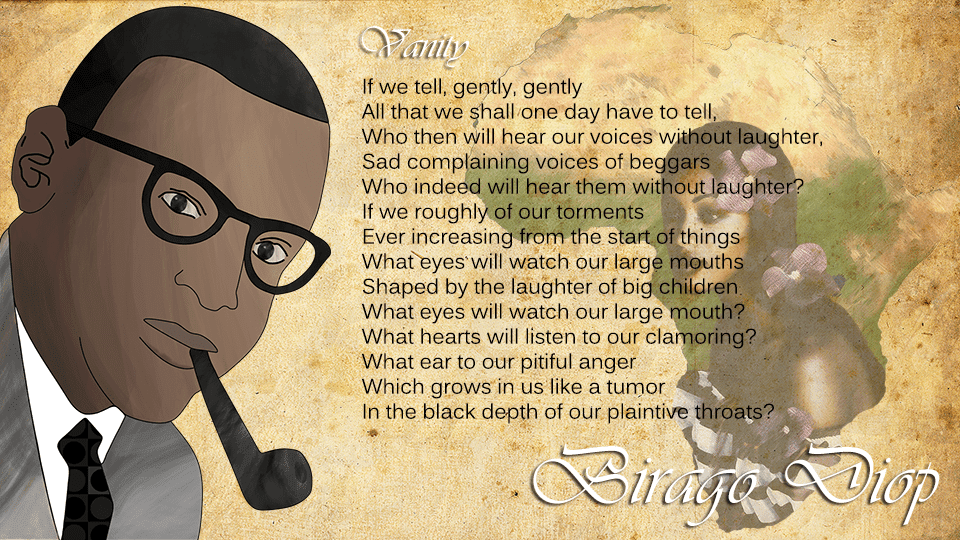Back to: LITERATURE IN ENGLISH SS2
Welcome to class!
In today’s class, we will be talking about reading and analyzing African poetry: “Vanity” by Birago Diop. Enjoy the class!
Reading and Analyzing African Poetry: “Vanity” by Birago Diop

READING AND ANALYSING THE CONTENT OF THE POEM “VANITY.”
This is a poem of lamentation. The poet is worried about the social misfortune that is befallen his people and the seeming indifference of the people to the apparent solution. The poet sees the problems as self-inflicted. He also sees the answers to the problem but they seem not to listen. The first two stanzas capture the complaints of the community and the people’s contemptuous reaction. The poet says that no outsider will take the cries of the community serious because they are not only trivial, and self-inflicted, the people themselves are not serious and receptive to their traditions and ancestry. The poet states that the community’s approach to airing their complaints, whether gently or loudly, will not mitigate the derisive reaction of the people. This is seen in lines 1 and 6. The poet goes on to say that the complaints of the people did not start today. He depicts the people as insincere.
The poet proffers answers to the question of Africa’s unending social trauma in the succeeding stanzas. Africans must look inward to solve their problems. We must go back to our roots, recognize our ancestors, take pride in our tradition, believe in ourselves and our products and stop the crazy dependence on foreign ideas. The poet sees it as sheer vanity looking up to Western civilization to solve our domestic problems while the basic facts of existence are left unattended.
The last stanza is a logical deduction from the preceding lines. The poet concludes that it is futile complaining when we know the source of our predicaments but refuse to amend our ways. To him, Africans can only fare well if she recognizes continually the undying presence of the ancestors and obeys their instructions.
THEMES AND POETIC TECHNIQUES IN THE POEM
- Abandonment of traditional ways or values: The poem comments on the tendency of African educated elites and other Westernized Africans to abandon African wisdom, values and general traditional ways of life because many of these people have led Africans to believe that African ways of life is primitive and barbaric.
- Wisdom of the ancestors is invaluable: The poem presents ancestors as a reservoir of sound teaching and wisdom, which are sufficient to guide their offspring through the challenges of life.
- Warning to renegades: The entire poem can be seen as a warning to renegades. The poem warns those who have chosen not to listen to the voice of the elders, the voice of wisdom and voice of the ancestors.
- Pain and misery.
- The reality of human suffering and predicaments
POETIC TECHNIQUES
- Rhetorical question: This device is used in lines 5, 8, 10, 11, 14 and30.
- Humour/sarcasm: There is certain humour or sarcastic tone to the poet’s reference to ‘largemouths’, ‘sad voice’, ‘beggars’ etc.
- Synecdoche: Examples of this device are ‘ears’, ‘eyes’ ‘hearts’ as used in the poem.
- Simile: Examples of simile can be seen in line 13: “which grows in us like a tumour”.
- Metaphor: This is used in line four. Black Africa is seen as beggars.
- Enjambment: Most of the lines in the poem run into one another.
EVALUATION
- A fable is a story in which A. allegations are made about characters. B. animals or things are used as characters. C. there is an important setting. D. the story is told in poetic form.
- The juxtaposition of two contrasting ideas in a line of poetry is A. euphemism. B. synecdoche. catharsis. D. oxymoron.
- Drama is the representation of a complete series of actions by means of A. movement and gesture for the screen and audience. B. speech, movement and gesture for the stage only. C. speech, movement and gesture for the stage, screen and radio. D. movement only.
- Identify the odd item. A. Poetry B. Prose C. Melodrama D. Drama
- “All the world is a stage,” is an example of A. metaphor. B. paradox. C. allusion. D. personification.
In our next class, we will be talking about Reading and Textual Analysis of Non-African Prose: The Castle of Otranto by Horace Walpole. We hope you enjoyed the class.
Should you have any further question, feel free to ask in the comment section below and trust us to respond as soon as possible.
